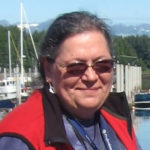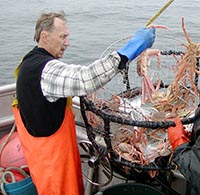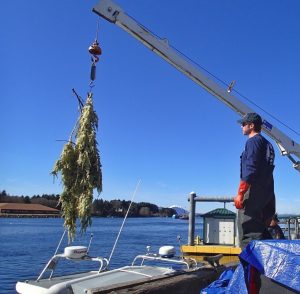Council volunteer Kate Morse recently received a Conservation Achievement Award from Alaska Conservation Foundation. These prestigious awards recognize individuals and organizations committed to protecting Alaska. The Council was proud to support Kate’s nomination for the Jerry S. Dixon Award for Excellence in Education, which rewards educators who integrate stewardship of Alaska’s natural environment.
Volunteer Spotlight
Volunteer Spotlight: Patience Andersen Faulkner
A good neighbor reflects on the art of listening

Patience Andersen Faulkner creates beautiful beadwork, leatherwork, hand-knitted items, traditional drums, and baskets among other artistic endeavors.
But she is also a lifelong student of the art of conversation. Only a few minutes into a chat, and the listener feeling valued, respected, and entertained.
Steve Lewis: How a grizzly bear hide resulted in safer tanker traffic in Alaska
Volunteer profile

Steve Lewis hails from a large family of farmers and ranchers who settled in Colorado and Nebraska in the late 1800s. When he was little, his father was in the U.S. Navy and often at sea, so Lewis spent a lot of time at his Uncle Chester’s house.
“It was a typical high-plains two story farmhouse,” Lewis recalls. Uncle Chester loved hunting and fishing, and Lewis has vivid memories of his uncle’s trophies from a trip to Alaska.
Along the stairwell, a Kodiak brown bear pelt reached from bottom of the first floor almost to the ceiling of the second floor. Little Lewis had to run past that bear to get to his bedroom, where a moose head hung.
“I KNEW that the other half of that moose was on the other side of that wall, and he was going to come through and get me.”
“So that was my introduction to Alaska.”
North to Alaska
Fortunately for the Council, that imaginative kid never lost his fascination with the state.
Davin Holen: Social scientist uses knowledge of subsistence fisheries to help communities adapt to changing environments

At 17, Davin Holen left his home in the woods outside of Wasilla, Alaska, to travel the world. He lived and studied in South America and Europe for several years before joining the Peace Corps, where he ended up in Mali, West Africa, living in a small mud hut on the edge of the Sierra Desert with his wife, Cara.
“No running water, no electricity. It was like camping in the desert for two and a half years,” Holen says.
Holen’s experience in Africa sparked a curiosity about human culture that has turned into his life’s work.
“I was really interested in people’s interactions with the environment, especially in a subsistence economy.”
He realized that even though he grew up in Alaska, he did not know much about the cultures in his home state. He returned from Africa and enrolled in the Master’s program at the University of Alaska Anchorage in Applied Cultural Anthropology. The department was brand new, and Holen was its first graduate.
After earning his degree, he went to work for the Alaska Department of Fish and Game’s Division of Subsistence, working his way up from an internship to program manager over 15 years. Holen assessed subsistence harvests all over the state, from Southeast Alaska to the Arctic. He tried to understand and document these fisheries, in order to anticipate problems that could arise, so he could find ways to address upcoming expected needs.